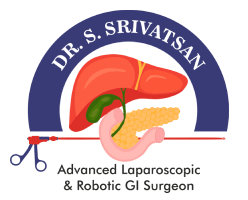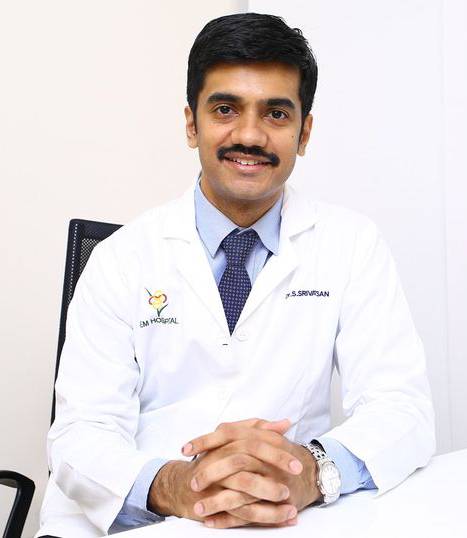- +919677231111 Call Us Now
- drsrivatsan@gmail.com Drop Us a Line
Achalasia Treatment In Chennai
Are you suffering from difficulty in swallowing food, or water? Achalasia, also known as achalasia-cardia or esophageal achalasia, is a condition in which the esophagus the tube that carries food from the mouth to the stomach is unable to move the food into the gut. The lower esophageal sphincter (LES) is a ring of muscle fibers that surrounds the lower end of the esophagus where it joins the stomach. Most patients are suffer from this rare condition but due to unaware of that condition they don’t understand this condition and don’t get the right treatment.
Dr. Srivatsan Gurumurthy is one of the best surgical gastroenterologists at GEM Hospital Chennai and provides the treatment of this rare condition. On this page, he explains all about this disease, its symptoms, causes, diagnosis, and the right treatment option for this. He specializes in robotic and laparoscopic surgery for cancer of the esophagus (food pipe), stomach, large intestine (colon and rectum), pancreas, gallbladder, and liver.
What is achalasia?
Achalasia, a condition affecting the esophagus, disrupts the usual function of the lesser esophageal sphincter( LES), a brawn ring that aids indefectible food passage into the stomach. Unfortunately, the LES doesn’t relax as it should, creating a bottleneck and making the trip of food and liquids from the esophagus to the stomach fairly challenging.
While the exact cause of achalasia remains kindly unclear, it’s allowed to involve whim-whams damage in the esophagus. Common or garden symptoms encompass difficulties in swallowing, regurgitation of undigested food, casket pain or discomfort, and unintentional cargo loss. Due to the LES’s failure to relax meetly, food tends to loiter in the esophagus, leading to a sensation of wholeness.
Who Can Get Achalasia-Cardia?
Achalasia cardia can impact individuals across various age groups, with a higher prevalence observed among adults aged 25 to 60. This condition shows no gender preference, affecting both men and women inversely. Although the precise cause of achalasia remains not entirely understood, there’s a prevailing belief that it involves whim-wham damage in the esophagus. While no definitive substantiation points to a specific inheritable link to achalasia, cases live where multiple families.
It’s crucial to highlight that achalasia is relatively uncommon. Experiencing symptoms like difficulty swallowing or regurgitation does not automatically indicate achalasia. If someone is exhibiting symptoms suggestive of achalasia in connection with Dr. Srivatsan Gurumurthy, seeking medical attention is recommended for a precise diagnosis and appropriate care.
Achalasia symptoms:
Achalasia can present with a range of symptoms, including:
- Difficulty Swallowing (Dysphagia): One of the key signs is struggling to swallow, especially when it comes to solid foods. This difficulty arises from the lesser esophageal sphincter( LES) not relaxing duly.
- Regurgitation of Undigested Food: People with achalasia might witness regurgitation of undigested food, constantly convoyed by a sour taste. This occurs because the LES fails to grease the smooth passage of food into the stomach.
- Chest Pain or Discomfort: Some identities with achalasia may feel chest pain or discomfort. This can be attributed to the buildup of food in the esophagus, leading to gained pressure.
- Weight Loss: Patient challenges with swallowing and regurgitation can affect unintentional weight loss over time.
How to diagnose Achalasia-Cardia?
Diagnosing Achalasia-Cardia typically involves a combination of clinical evaluation, imaging studies, and specialized tests. Here is an overview of the diagnostic process:
- Clinical History and Physical Examination: The healthcare provider will start by taking a detailed medical history, involving a thorough deliberation of symptoms similar to difficulty swallowing, regurgitation, casket pain, and cargo loss.
- Barium Swallow Test (Esophagram): This is a radiographic test where the patient quaffs a barium discrepancy result, and x-ray images are taken. It helps visualize the shape and function of the esophagus and can punctuate abnormalities, similar to the symptomatic” raspberry’s beak” appearance associated with achalasia.
- Esophageal Manometry: This is a crucial individual test for achalasia. A slim, adjustable pipe( catheter) is passed through the nose and into the esophagus to measure the pressure and collaboration of brawn condensation along the esophagus.
- Endoscopy: A bendable tube, fitted with a camera( endoscope), is gently placed through the mouth into the esophagus to gain a clear visual of the contents in the esophagus, stomach, and duodenum. While endoscopy might not directly identify achalasia, it proves precious in barring other possible causes of symptoms.
- CT or MRI Scan: In some cases, imaging inquiries similar to reckoned tomography( CT) or glamorous resonance imaging( MRI) may be exercised to estimate the deconstruction of the esophagus and girding structures.
Treatment of Achalasia:
Achalasia is a condition that affects the ability of the esophagus to move food into the stomach. There are two main types of treatments for this condition: non-surgical and surgical.
Non-Surgical Treatment of Achalasia-Cardia:
In the non-surgical treatment of Achalasia-Cardia, guided by healthcare professionals like Dr. Srivatsan Gurumurthy, is various approaches may be considered:
- Medications: Prescription of calcium channel blockers or nitrates to help ease the lower esophageal sphincter (LES) tension, facilitating better food passage into the stomach.
- Botulinum Toxin (Botox) Injections: In certain cases, Dr. Srivatsan Gurumurthy may recommend Botox injections directly into the LES during an endoscopic procedure. This temporarily relaxes the sphincter muscles, making it easier for food to pass through. Keep in mind that the goods are short-term and may bear periodic reiteration
- Balloon Dilation (Pneumatic Dilation): This procedure entails fitting a balloon into the LES, and inflating it to stretch and widen the sphincter. This helps palliate the inhibition, enhancing swallowing.
- Lifestyle and Dietary Adjustments: Cases may admit advice on life and salutary changes. This can include consuming lower, more frequent refections, avoiding foods that are challenging to swallow, and espousing an upright posture during and after refections.
Surgical Treatment:
When it comes to addressing Achalasia-Cardia with surgical expertise from healthcare professionals like Dr. Srivatsan Gurumurthy is Robotic Surgeon in Chennai various procedures may be considered:
- Heller Myotomy: In this primary surgical intervention for achalasia, the surgeon cuts or releases the muscles of the lower esophageal sphincter( LES). This initiative aims to ease the passage of food into the stomach. In certain cases, a contemporaneous anti-reflux procedure( fundoplication) may be performed to help acid influx.
- Laparoscopic Surgery: Many myotomy procedures, involving Heller myotomy, can be carried out utilizing minimally invasive ways. Through fragile lacerations, laparoscopic surgery involves the use of a camera and technical instruments for precise pushes. This path frequently leads to ready reclamation moments assimilated to traditional open surgery.
- Peroral Endoscopic Myotomy (POEM): POEM offers a less invasive endoscopic alternative. Then, the surgeon creates a lair through the esophageal filling, performing myotomy to release the LES. This procedure utilizes an endoscope passed through the mouth, barring the want for foreign lacerations.
- Fundoplication: To control future problems with gastroesophageal reflux disease (GERD), Dr. Srivatsan Gurumurthy also performs a procedure called fundoplication at the same time as the Heller myotomy. This method involves wrapping the upper part of the abdomen around the lower esophagus to make a new valve that prevents stomach acid from flowing back up into the esophagus. This can help to improve symptoms and prevent complications such as gastroesophageal reflux disease (GERD). Fundoplication is normally performed using minimally invasive laparoscopic methods, which further enhances patient recovery and reduces postoperative distress.
Why Choose Dr. Srivatsan Gurumurthy for Achalasia Treatment?
- Specialized Expertise: Dr. Srivatsan Gurumurthy brings a substance of technical knowledge and moxie in gastroenterology and gastrointestinal surgeries, especially in treating Achalasia. His immersed experience makes him a trusted liberty for those seeking complete care.
- Thorough Patient Evaluation: Dr. Srivatsan Gurumurthy ensures a meticulous examination of each case. This involves a detailed valuation of symptoms, medical history, and individual experiments, allowing for a precise opinion and the coinage of an individualized treatment plan.
- Patient-Focused Approach: Dr. Srivatsan gurumurthy adopts a case- concentered path, laboriously involving individualities in their healthcare trip.
- Cutting-Edge Treatment Options: Well-clued in the rearmost creations and treatment modalities for Achalasia, Dr. Srivatsan Gurumurthy tailors treatment plans to meet the special requirements of each case. Whether esteeming surgical interventions or surgical procedures, he stays at the van of ingenious approaches.
- Minimally Invasive Techniques: Dr. Srivatsan Gurumurthy embraces minimally invasive surgical ways to enhance patient issues. Procedures similar to laparoscopic surgery or Peroral Endoscopic Myotomy( Lyric) are conducted with perfection, frequently performing in quicker recovery times and minimizing discomfort.
Frequently Asking Questions (FAQ's):
Dr Srivatsan Gurumurthy is one of the best doctors in Chennai for achalasia Treatment. He is an experienced surgeon who has experience in treating various types of esophageal diseases.
Achalasia Cardia is treated using non-surgical and surgical ways based on the patient's condition. Dr. Srivatsan Gurumurthy has identified the treatment plan required for the patient's health and coordinated with the patient.
Managing achalasia? Opt for tender foods, softer bread, and cooked veggies, and avoid carbonation and spice. Limit alcohol and caffeine. Opt for smaller, frequent meals to reduce blockage risk. Listen to your body and consult healthcare pros or dietitians for personalized guidance.
Achalasia can be managed without surgery using medications, like calcium channel blockers, Botox injections, and Balloon Dilation. Lifestyle adjustments, such as smaller meals, aid symptom control. Tailored non-surgical options offer effective solutions for achalasia
Yes, achalasia surgery can be safe. However, like any surgery, it does carry some risks and possible complications. The specific risks and outcomes will rely on the type of surgery performed and the particular patient's health status.
WhatsApp us

